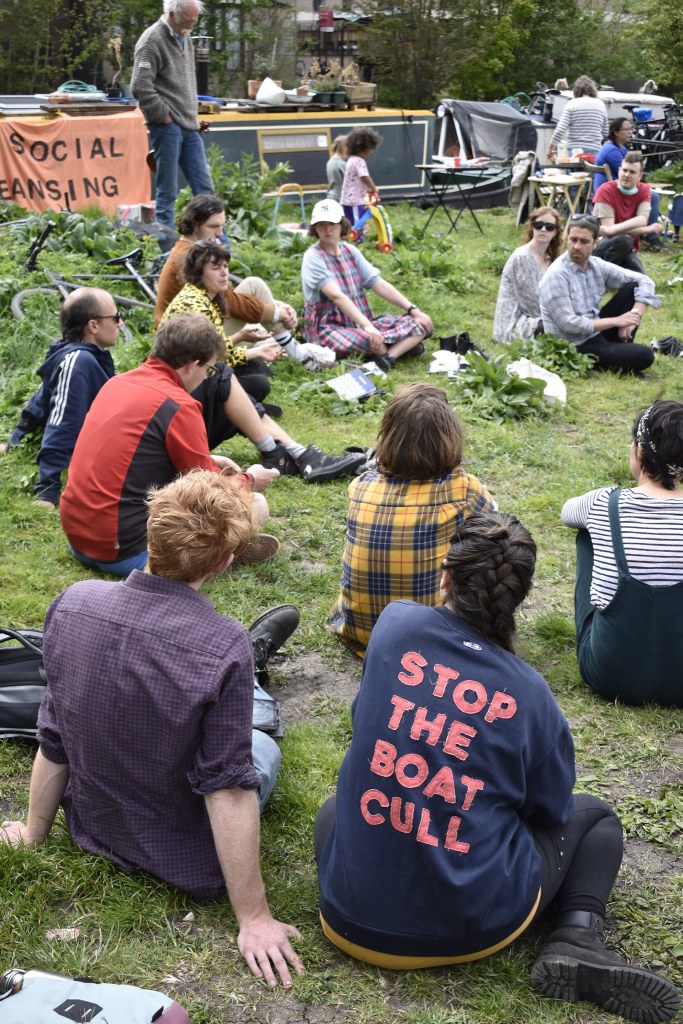OPEN-AIR MEETING AND PICNIC
Monthly Archives: July 2021
ON BAD TERMS (AND CONDITIONS)
Recent proposed changes to CRT Terms & Conditions (T&C’s) have provoked the ire of both leisure and live-aboard boaters.
Boaters opposing changes to T&Cs are in agreement in challenging the lack of consultation and legal basis for changes, which seem to clearly infringe on boaters’ rights outlined in the 1995 Waterways Act. These latest T&Cs define 2 separate types of licence; one for leisure users, and another for ‘Continuous Cruising’ (CC-ers). The accompanying granularly detailed restrictions seem like overkill at best, and at worst appear to be targeting and further marginalising those CC-ers who are less affluent (ie. towing restrictions). In yet another instance of duplicity, CRT T&Cs say it “may provide your relevant personal details to anyone who we believe has a legitimate interest to have the details”, whilst also claiming it can’t engage with boaters directly via email (to consult on issues) because of GDPR.
NBTA’s solicitors have sent a second legal pre-action protocol letter to CRT over our belief that at least parts of CRT’s T&Cs are unlawful. CRT then made minor changes. These changes included removal of:
‘10.10: The Boat must not display an association with, or advertise, any company, business or service without Our (CRT’s) express consent in writing.’
However there are still a lot more clauses like this in their new T& C’s.
THE POWER OF WORKING TOGETHER
Over 12 years ago some boat dwellers without home moorings in the Reading area pulled themselves together to form the National Bargee Travellers Association (NBTA). This was in response to extra enforcement in the Reading area. Their campaign against increased enforcement forced the authorities to back down.
Over the following years, NBTA membership would expand and so would its achievements. The resulting NBTA campaigns ensured that CRT followed the Equalities Act 2010, and helped to get boat dwellers into an Act of Parliament where Local Councils are required to do needs assessments for boat dwellers in their local area.
Throughout its existence, NBTA has helped to stop individuals being evicted and ensure they are able to get access to healthcare and education for their children. When necessary, NBTA sets up campaigns, varying from fighting against mooring spaces being taken away, to campaigning to get more boater facilities, to organising the community against boater evictions.
However, it must be said NBTA wouldn’t exist without people being a part of it. When we say NBTA did this or did that, the reality is that these things are being done by boat dwellers just like you; they might even be moored next to you. We believe more can be changed or protected when we work together as an organisation. The more people working together in the organisation, the more that can be done.
So if you’re not already, why not consider being one of the people who does something to protect our way of life?
Our meetings take place on the last Sunday of each month at 4pm. Our next meeting is on Sunday 25th July.
Due to Covid, meetings take place on line. You can also join by phone. Here are the joining details:
Alternatively, you can use the dial in details:
Dial-in: +44 330 808 1706 PIN: 45925961#
Second Stage of “Safety Zones” Consultation Opened
The second stage of the “Safety Zones” consultation has opened and will take the form of a “bilateral mediated discussion” between two boater representatives and two CRT representatives.
We requested that various boater constituencies with specific vulnerabilities be represented and we requested a direct discussion with the rowers but neither of these requests have been heeded.
Instead of asking boaters to nominate two representatives, two boaters were nominated by Hopkins Van Mil, the facilitators of the consultation. We have indicated that this is unacceptable and have nominated two boaters to represent us, who were voted on by the NBTA.
We have responded to the invitation to the second stage of the consultation with the following questions:
- What is the objective of the bilateral meeting?
- Will the CRT provide granular data concerning safety incidents prior to the meeting?
- Will the CRT be putting forward new policy proposals in the meeting?
- Will new policy proposals be developed as a result of this meeting?
- If yes, will feedback on those proposals be sought from stakeholders?
- What other bilateral meetings are scheduled?
- Will a facilitated bilateral meeting between rowers and boaters be held?
- Will the feedback from the stakeholder engagement form be shared prior to the meeting?
- Will the meeting be audio recorded?
- Will minutes of the meeting be publicly available?
Because the CRT has not provided detailed evidence regarding the alleged safety concerns, or undertaken any genuine investigation, these discussions are unlikely to be fruitful. In order to make progress on this issue, we have proposed that the CRT develop a new proposal that is supported by evidence and based on a dialogue between the affected groups.



